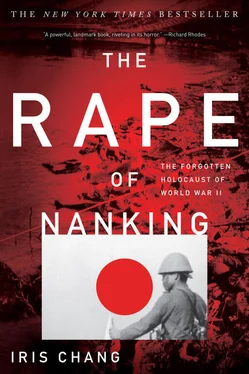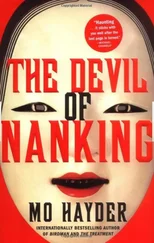The idea was not universally accepted at first. The Japanese, for one, flatly refused to honor it. And as enemy troops approached the city, the zone committee heard urgent pleas not only from friends and family but from Chinese, Japanese, and Western officials to abandon the project at once and flee for their lives. In early December the American embassy staff insisted that the zone leaders join them onboard the USS Panay, a gunboat packed with diplomats, journalists, and Western and Chinese refugees as it prepared to move upriver away from Nanking. But the zone leaders politely declined the offer, and after giving them a final warning, the diplomats on the Panay sailed away on December 9, 1937, leaving the remaining foreigners to their fate.
Interestingly enough, the Panay would later be bombed and machine-gunned by Japanese aviators. On the afternoon of December 12, Japanese aviators sank the gunboat without warning, killing two people and wounding numerous others, even circling over the area repeatedly as if they planned to exterminate the survivors, who hid under a thicket of riverbank reeds. The reasons for the attack were unclear. The Japanese later claimed that their aviators lost their cool judgment in the heat of battle and that fog or smoke prevented them from seeing the American flags on the Panay, but this claim was later proven to be demonstrably false. (Not only was the day of the bombing sunny and cloudless, but the Japanese aviators had received explicit orders to bomb the Panay, orders the aviators carried out reluctantly only after vehement protests and arguments.) Today some suspect that the bombing was a test to see how the Americans would react, while others believe it was the result of internal politics within the Japanese high command. But whatever the reason behind the attack, the city of Nanking turned out to be a safer place for the remaining foreigners than the Panay.
The first refugees to enter the Nanking Safety Zone were those who had lost their homes to aerial bombardments or had abandoned homes on the outskirts of the city in the face of the approaching Japanese army. Soon these first refugees packed the camps so densely that it was said that many had to stand without sleeping for several days until new camps were added. Once the city fell, the zone housed not just thousands but hundreds of thousands of people. For the next six weeks the committee had to find a way to provide these refugees with the bare necessities of survival—food, shelter, and medical care. The committee members also had to protect them from physical harm. Often this required on-the-spot intervention to prevent the Japanese military from proceeding with some threatened action. And through it all, though no one asked them to do so, they documented and broadcasted Japanese outrages to the world. In doing so, they left a written record for posterity of what they had witnessed.
In retrospect, it seems almost miraculous that some two dozen foreigners managed to do everything they did while fifty thousand Japanese soldiers ripped apart the city. Remember, by occupation these men and women were missionaries, doctors, professors, and executives—not seasoned military officers. Their lifestyles had been sheltered and leisurely. “We were not rich,” one woman said of that period, “but a little foreign money went a long way in China.” Many were ensconced in luxurious mansions, surrounded by teams of servants.
Strangely, because of an incident in Nanking a decade earlier, most expected to have more trouble with the Chinese than the Japanese. Those who had been in Nanking in 1927 remembered that during the Nationalist invasion of the city, Chinese troops recklessly killed foreigners and besieged a group of them, including the American consul and his wife, in a house on top of Socony Hill. (“Would they kill us?” one woman wrote of that horrible time. “Would they torture us as in the Boxer? Would they do worse? Torture the children before our eyes? I did not let my mind touch what they might do to us as women.”) Indeed, one of the foreign eyewitnesses of the 1937 massacre admitted: “We were more prepared for excesses from the fleeing Chinese… but never, never from the Japanese. On the contrary, we had expected that with the appearance of the Japanese the return of peace, quiet and prosperity would occur.”
The heroic efforts of the Americans and Europeans during this period are so numerous (their diaries run for thousands of pages) that it is impossible to narrate all of their deeds here. For this reason, I have decided to concentrate on the activities of three individuals—a German businessman, an American surgeon, and an American missionary professor—before describing the committee’s achievements as a whole. On the surface, the three could not have been more different.
THE NAZI WHO SAVED NANKING
Perhaps the most fascinating character to emerge from the history of the Rape of Nanking is the German businessman John Rabe. To most of the Chinese in the city, he was a hero, “the living Buddha of Nanking,” the legendary head of the International Safety Zone who saved hundreds of thousands of Chinese lives. But to the Japanese, Rabe was a strange and unlikely savior. For he was not only a German national—a citizen of a country allied with Japan—but the leader of the Nazi Party in Nanking.
In 1996 I began an investigation into the life of John Rabe and eventually unearthed thousands of pages of diaries that he and other Nazis kept during the Rape. These diaries led me to conclude that John Rabe was “the Oskar Schindler of China.”
Prior to the Rape, Rabe had led a relatively peaceful though well-traveled life. The son of a sea captain, he was born in Hamburg, Germany, on November 23, 1882. After completing his apprenticeship in Hamburg he worked a few years in Africa and then in 1908 moved to China, where he found employment at the Peking office of the Siemens China Company. In 1931 he transferred to the Nanking office, selling telephones and electrical equipment to the Chinese government. Bald and bespectacled, dressed in conservative suits and bow ties, he looked like a typical, middle-aged Western businessman in the city. Soon he became a pillar of the German community in Nanking, administering his own German school for elementary and junior high school students.
As the years went by, Rabe became a staunch supporter of Nazism and the representative town leader for the Nazi Party in Nanking. In 1938 he would tell German audiences that “I believe not only in the correctness of our political system but, as an organizer of the party, I am behind the system 100 percent.”
Decades later his granddaughter, Ursula Reinhardt, insists that Rabe saw the Nazi Party primarily as a socialist organization and did not support the persecution of Jews and other ethnic groups in Germany. This may well be true. During his visits to various ministries in Nanking, Rabe repeatedly summed up his Nazi philosophy in socialist terms: “We are soldiers of work, we are a government of workers, we are friends to the worker, we will never leave the worker’s side in times of crisis.”
When most of his fellow German nationals, on the advice of friends and embassy officials, departed China long before the Japanese military reached the gates of the city, Rabe chose to stay and was soon elected the head of the Safety Zone. In fact, even when Japanese embassy officials met with him and suggested more strongly that he leave, he remained. Dispatched by his superiors to protect Rabe during the fall of Nanking, Japanese Major Oka asked him: “Why in the devil did you stay? Why do you want to involve yourself in our military affairs? What does all this matter to you? You haven’t lost anything here!”
Rabe paused for a moment, then gave Oka his answer. “I have been living here in China for over thirty years,” Rabe said. “My kids and grandchildren were born here, and I am happy and successful here. I have always been treated well by the Chinese people, even during the war. If I had spent thirty years in Japan and were treated just as well by the Japanese people, you can be assured that, in a time of emergency, such as the situation China faces now, I would not leave the side of the people in Japan.”
Читать дальше











